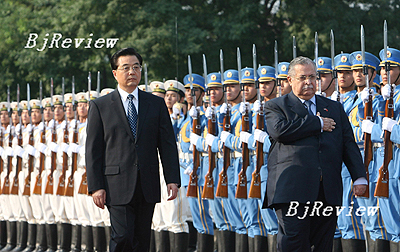
Iraqi President Jalal Talabani, the first Kurdish president in Iraqi history, is no stranger to China. He translated the Selected Works of Mao Zedong into Kurdish; he paid two visits to China, in 1955 and 2003 respectively, before assuming presidency; he published articles in a local newspaper introducing China to the public; he enjoys Chinese cuisine and can even speak some Chinese words.
Talabani started his third visit to China on June 20, a weeklong sojourn and his first state visit as Iraqi president. He is the first Iraqi president to visit China since the two countries established diplomatic relationship in 1958. This time, his mission was to build a bridge of cooperation between the two countries.
Sino-Iraqi agreements
China and Iraq signed four agreements in Beijing on June 21, with Chinese President Hu Jintao and Talabani attending the signing ceremony. The agreements covered the canceling of part of Iraq's debt, increased cooperation between the two foreign ministries, enhanced economic and technical cooperation and the setting up of a human resources training program.
Hu described Talabani as "an old friend of the Chinese people" and said that Talabani's visit to China would "add new energy to bilateral ties and open a fresh chapter."
China would continue to do what it could, Hu said, to help Iraq's reconstruction by encouraging Chinese firms to take part in and train professionals for the task. Hu proposed that China and Iraq enhance cooperation in education, culture and health care, and declared that China was ready to sign a yearly action plan with Iraq with respect to cultural exchanges. China would also enhance coordination with Iraq on international and regional issues, noted the Chinese president, and would exchange views with Iraq on issues of mutual concern through such established mechanisms as foreign ministry-level consultations.
"The China-Iraq friendship goes back more than 2,000 years," Hu stated, "to the time when the ancient Silk Road linked the two peoples together. Since the two countries forged diplomatic ties, and especially after the new Iraqi Government was established, China-Iraq relations have entered a new stage of development."
Hu concluded that the Chinese Government and people respect the rights and choices of the Iraqi people, and supported the efforts Iraq had made to safeguard national independence, sovereignty and territorial integrity.
Talabani said that Iraq was grateful to China for its assistance and considered China one of its real friends. Talabani suggested that China and Iraq promote cooperation in such areas as trade, science and technology, energy and culture, and explore new cooperative fields.
During his stay in China, Talabani also met with Chairman of the Standing Committee of the National People's Congress (NPC) Wu Bangguo and Premier Wen Jiabao. Besides Beijing, the Iraqi President also visited Xi'an and Nanjing in northwest and east China respectively.
"The NPC is ready to conduct friendly exchanges and cooperate with the newly established Iraqi Parliament, to enhance mutual understanding and friendship between the two peoples, promote bilateral cooperation in various fields and strengthen the overall development of bilateral ties," said Wu on June 22.
"The two countries respect each other politically and support one another on issues concerning our core interests," said the top legislator. "The two countries have a traditional friendship, and bilateral trade and economic cooperation have gradually resumed and developed."
Talabani said that the Iraqi Government, Parliament, political parties and people from all circles were in favor of developing friendly relations with China. He said Iraq was ready to learn from China's development experience and to strengthen cooperation with China in various fields. He hoped China-Iraq relations would become a model of friendly cooperation.
| 